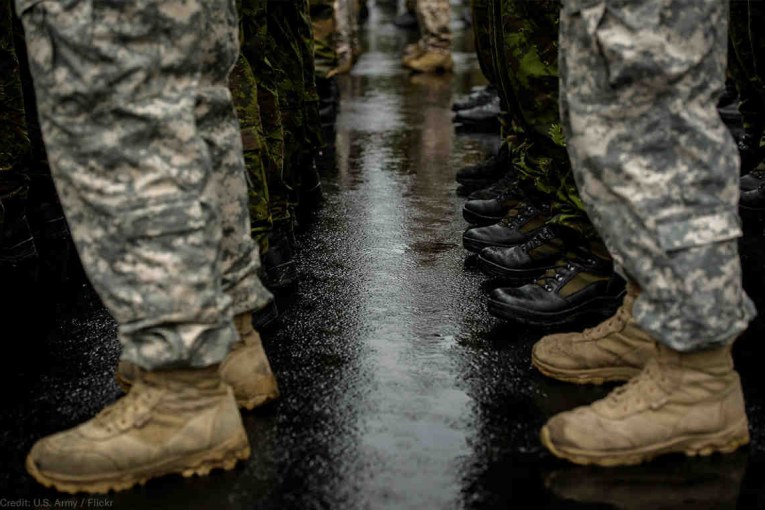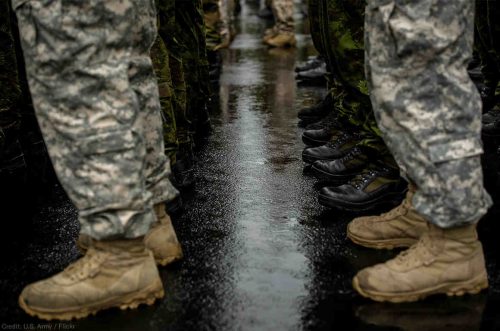
 By Sameer Ahmed and Imaan Patel
By Sameer Ahmed and Imaan Patel
Despite attacking family members of fallen war heroes, criticizing Sen. John McCain for being captured in war, and recently deploying troops to the border for a costly and unnecessary political stunt, President Donald Trump has nonetheless boasted about his supposed support for military service members. During his presidential run, Trump even went so far as to say that, “There’s nobody bigger or better on the military than I am.” And yet, the Trump administration has quietly been taking action against immigrants who have wished for nothing more than to serve in the personnel-starved U.S. armed forces.
Last week, a federal court in San Francisco issued a ruling that blocks a discriminatory Trump administration policy that has prevented hundreds of lawful permanent residents — immigrants who possess green cards — from serving in the U.S. military. U.S. District Judge Jon S. Tigar found that the Trump administration provided no rational justification for the policy, which bars lawful permanent residents from serving in the military until unspecified background investigations are completed. “If there was no evidence that LPRs posed a greater security risk, this policy change is by definition arbitrary and capricious,” Judge Tigar wrote.
In October 2017, Secretary of Defense James Mattis instituted the policy, which forces lawful permanent residents to pass new, undefined, and vague background investigations and requirements before even shipping out to basic training. The policy does not explain what these background investigations entail, how long they are expected to take, or why they are necessary. Indeed, lawful permanent residents are heavily vetted before getting their green cards, and the Trump administration has never provided evidence indicating that lawful permanent resident enlistees posed more of a risk than U.S. citizens.
The policy has actively harmed the military’s recruitment efforts and reversed years of Pentagon policy that permitted lawful permanent residents to join the U.S. military on the same terms as U.S. citizens. Earlier this year, the ACLU Foundation of Southern California, the ACLU Foundation of Northern California, and the law firm Latham & Watkins LLP filed a class action lawsuit on behalf of all lawful permanent residents who have enlisted in the U.S. armed forces but have effectively been prevented from serving because of the policy.
citizens. Earlier this year, the ACLU Foundation of Southern California, the ACLU Foundation of Northern California, and the law firm Latham & Watkins LLP filed a class action lawsuit on behalf of all lawful permanent residents who have enlisted in the U.S. armed forces but have effectively been prevented from serving because of the policy.
This has left hundreds of lawful permanent residents seeking to serve in a state of limbo. Jiahao Kuang, one of the named plaintiffs in the ACLU lawsuit, applied to enlist in the U.S. Navy following his junior year of high school. Although Kuang graduated high school with a 3.8 GPA, Kuang decided to forego applying to college because he wanted to give back to the United States and serve in the Navy.
Kuang said that the new policy forced him to “basically put my life on hold.” He has forgone major life events — like taking the SATs, applying to college, and taking on internships — with the expectation that he would ship out to boot camp soon after his high school graduation. Despite the obstacles erected in his path by the Trump administration, Kuang said that he just wants to “give  back” in return for what he believes “this country has given me.” With the recent court ruling, Kuang is hopeful that he will get to serve soon.
back” in return for what he believes “this country has given me.” With the recent court ruling, Kuang is hopeful that he will get to serve soon.
Prior to the Trump administration’s policy, the U.S. armed forces had a longstanding commitment to recruiting immigrants, from the time of the American Revolution to the present wars in Iraq and Afghanistan. This commitment has been nonpartisan, as those on both sides of the aisle have always demonstrated support for immigrants who wish to serve their adopted country. Many speak a second language other than English, and immigrant recruits generally have better qualifications and lower attrition rates in comparison to U.S. citizen recruits.
In fact, it was President George W. Bush who signed an executive order after 9/11 to provide a path to expedited naturalization for noncitizens serving in the armed forces in order to incentivize noncitizen enlistment. The Trump administration has undermined this policy as well, leaving immigrants who have enlisted and served in the military in limbo and at risk of deportation. The ACLU Foundation of Southern California filed a lawsuit in July 2018 on behalf of a medal-winning, DACA-eligible soldier who was discharged from the U.S. Army, although she remained eligible for U.S. citizenship based on her over four years of honorable military service. Because of the ACLU lawsuit, the soldier was granted U.S. citizenship a few weeks later.
This shift in policy is just one of many attacks on immigrants coming out of the Trump administration. In service of his anti-immigrant agenda, Trump has undermined the armed forces and created unwarranted roadblocks for those who believe in the promise of America so passionately that they are willing to put their lives on the line. Members of Congress and the American people should push hard on the White House to rescind its discriminatory policy immediately.
Sameer Ahmed is a Staff Attorney with ACLU of Southern California & Imaan Patel is Law Clerk with the ACLU National Political Advocacy Department

Other than having to get through the partisan anti-Trump screed in the first couple of paragraphs in this article, this comment above covers it all. In the ACLU open-borders, sanctuary state view of the world, everyone that is not a citizen of the US apparently has even GREATER rights than do its citizens.
I have to wonder, based on the author’s name, if there are hidden agendas embedded somewhere in his/her view.
The simple counter here is that the US is rational, pragmatic and justified in thoroughly vetting all non-citizens, and others they suspect might have ties to radicalism, significantly more rigorously than others.
The ACLU and their leftist cohort are working hard to make the US military into just another college campus. But serving in the US military is not a right, it is a privilege. If you don’t like the process because it causes a few snowflakes to melt, then please direct the snowflakes to attend college where there are copious safe spaces available.
The judge found that the administration couldn’t provide even a rational basis (the lowest level of justification) to support changing the long-standing procedures on screening for enlistment in the military.
There are two authors–one apparently Muslim, the other likely Indian. I assume your comment is directed at Mr. Ahmed. Aside from the blatant racism evinced by this comment (do you also question the motives of blacks who advocate for voting rights?), there’s no hidden agenda. The explicit agenda is to prevent irrational discrimination against lawful permanent residents.
Too bad the US military did not apply rational rigorous vetting of Nidal Malik Hasan
Anonymously doubling down on the Muslim bigotry? Hasan was a U.S. citizen, born in Virginia.
That does not change my point. More rigorous vetting is a universal recommendation. But more for non-citizens. No Muslim bigotry at all… but an admitted dislike of the radicalism of a religion that sanctions killing of non-believers.
This documentary suggests that the military and Homeland Security needs to do a better job of vetting for domestic terrorists, in particular white supremacists, who seem to be joining the military:
Documenting Hate: New American Nazis